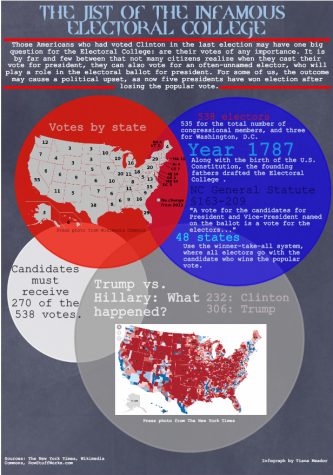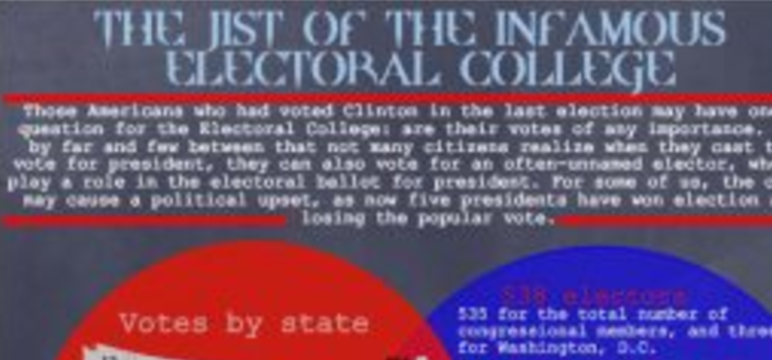The Electoral College, chaos-preventing necessity
January 3, 2016
 Donald Trump won the presidency, therefore the nation must be tearing apart. As the media says, the government must be rigged, and the Electoral College must hold some otherworldly power over the people. Matter of fact, the people’s vote must not even matter. Frankly, this is wrong.
Donald Trump won the presidency, therefore the nation must be tearing apart. As the media says, the government must be rigged, and the Electoral College must hold some otherworldly power over the people. Matter of fact, the people’s vote must not even matter. Frankly, this is wrong.
Every four years, the day after the first Monday of Nov, U.S. citizens head to the local voting centers in hopes of promoting a win for their next president and vice president of choice. The winner is declared unless the majority of Electoral votes say otherwise. But this is not the plague of unfairness that the noisy media proclaims it to be in fact, the Electoral College is a necessity for society to run democratically and furthermore, only the people can be to blame for an Electoral vote outcome.
The outcome of the recent election has people, students included, calling left and right for the absolute abolition of the Electoral College, but the claim falls ignorant since many may not realize the chaos that would result.
John Samples, reporter for The Cato Institute stated, “James Madison’s famous Federalist No. 10 makes clear that the Founders fashioned a republic, not a pure democracy. To be sure, they knew that the consent of the governed was the ultimate basis of government, but the Founders denied that such consent could be reduced to simple majority or plurality rule.”
Matter of fact, voters might be surprised to learn that when selecting their candidate, they in turn, are also casting a vote for electors.
However, it is not only this fairness factor that carries the point behind why the Electoral College should stay in place.
Determining a winner
Most foremost, the electoral college gives a sense of validity and a clear number to be placed on a win. A near tie in the number of popular votes, is highly unlikely, but a small difference in vote counts, and candidates are seeking recounts in any state that could swing their direction.
Richard Posner from Slate said, “The lawyers would go to work in state after state to have the votes recounted, and the result would be debilitating uncertainty, delay, and conflict—look at the turmoil that a dispute limited to one state, Florida, engendered in 2000.”
Almost all states give electoral votes on a winner-take-all basis, so a slight plurality can equate to a landslide in the electoral. Therefore since each state is awarded electoral votes on a proportionate population-vote manner, a tie nationwide in the electoral vote is not impossible but is highly unlikely.
Third party threat
If the United States had a popular vote system, third party candidates hold the threat to take away from the ensurance that a candidate could win a clear popular majority. In 2016, although Hillary Clinton won the popular vote, she only received a 48 percent plurality clearly not a majority, since the rest of the votes were to third parties.
Peter Wallison from The American Enterprise Institute said, “If we abandoned the Electoral College, and adopted a system in which a person could win the presidency with only a plurality of the popular votes we would be swamped with candidates. Every group with an ideological or major policy interest would field a candidate, hoping that their candidate would win a plurality and become the president.”
If we abandoned the Electoral College, and adopted a system in which a person could win the presidency with only a plurality of the popular votes we would be swamped with candidates. Every group with an ideological or major policy interest would field a candidate, hoping that their candidate would win a plurality and become the president.
— Peter Wallison
Ideological parties would surely come out of the darkness, swarming each election with single-issue candidates, purely ideological candidates, and even some factional parties. The assumption that there could be free trade and anti-trade parties, or pro-immigration and anti-immigration parties or even those based off of abortion rights is not wrong. The system would be swamped with non-party, single-issue specific candidates, not those who hold a set of ideals.
Even campaigning
Since the implementation of the Electoral, each presidential candidate is required to have a solid transregional appeal, not specific to certain regions.
Posner repeated, “No region (South, Northeast, etc.) has enough electoral votes to elect a president. So a solid regional favorite, such as Romney was in the South, has no incentive to campaign heavily in those states, for he gains no electoral votes by increasing his plurality in states that he knows he will win.”
The fact that transregional is required actually falls as a desirable result hence a candidate with only regional appeal is unlikely to become the nation’s next president. Furthermore if he or she as a regional candidate were to become the president, the presidency would be unsuccessful. Residents of regions where the candidate did not appeal are likely to feel disfranchised, and although that is occurring with the past 2016 election, the opposal towards President-Elect Donald Trump is scattered, over regionally concentrated.
“Against these reasons to retain the Electoral College the argument that it is undemocratic falls flat. No form of representative democracy, as distinct from direct democracy, is or aspires to be perfectly democratic. Certainly not our federal government. In the entire executive and judicial branches, only two officials are elected—the president and vice president. All the rest are appointed.” Said Posner.
So of course, The Electoral College has valid reasons to stay in place.
Opponents claim, however, that this form of electing is undemocratic, and therefore should be abolished. And it is reasonable to feel that way if they were with Hillary Clinton. However, throughout history, only five (counting President-Elect Trump) presidents have won solely on Electoral votes without the popular vote.
Only five. Those five being the elections of 1824, 1876, 1888, 2000, and 2016. And of those five, only two may hold relevance to those arguing against the Electoral College.
While the future of the Electoral College may be uncertain, one thing isn’t up for grabs: it’s likely to be a controversial subject well into the future.
— Kevin Bosner
No one voter’s vote is going change an entire national election, it is simply impossible. However, being active in politics can- of the eligible voters in America, only about one-half voted on Nov.8. And there is a fine line between voters who truly want to express a preference over those who believe one vote may think swing an election.
Even in states that truly reside Democrat or Republican, there are still votes in favor of the other side- showing the Electoral College is not of huge concern- and if it is, review the reasons for retaining the institution.
Kevin Bonsor and Laurie Dove from How Stuff Works said, “While the future of the Electoral College may be uncertain, one thing isn’t up for grabs: it’s likely to be a controversial subject well into the future.”
